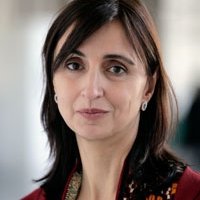The Rise of Global Anti-Semitism
Two experts discussed the global rise of anti-Semitism that has reappeared over the past several decades.
On October 22, 2014, the Joseph and Alma Gildenhorn Middle East Forum of the Middle East Program and the Global Europe program of the Woodrow Wilson Center and the Rabin Chair Forum of George Washington University hosted a meeting “The Rise of Global Anti-Semitism” with Walter Reich, Senior Scholar, Woodrow Wilson Center, Yitzhak Rabin Memorial Professor of International Affairs, Ethics and Human Behavior, The George Washington University, and Former Director, United States Holocaust Memorial Museum; and Roya Hakakian, Fellow, Woodrow Wilson Center, and author of Assassins of the Turquoise Palace and Journey from the Land of No: A Girlhood Caught in Revolutionary Iran. Haleh Esfandiari, Director, Middle East Program, Woodrow Wilson Center, moderated the event.
Reich began by explaining that anti-Semitism is often considered the world’s longest form of hatred; it has existed for over two millennia. He discussed how anti-Semitism was avoided in public during the decades following the Holocaust, but it still remained prominent in private. Recently, anti-Semitism is being expressed more overtly. He cited recent incidents in Europe, like the burning of synagogues, the desecration of Jewish cemeteries, and violent attacks targeting Jews to highlight the rise of global anti-Semitism. Reich stressed that blame cannot only be placed on Islamic fringe groups and that it is important to also condemn right-wing radical groups. This new form of anti-Semitism is different from past versions because it is expressed more in opposition to the Israeli nation-state than in opposition to Judaism. Reich outlined common tropes of anti-Semitism, such as Jews being more loyal to Israel than the country in which they live and Jews being in control of financial markets. He concluded his presentation by referencing an Anti-Defamation League survey that 26 percent of those surveyed globally believed that 6 out of 11 common Jewish stereotypes were “mostly true.” In the Middle East, this percentage was 74 percent; Iran registered the lowest at 56 percent.
Hakakian started by stating that the key to eradicating anti-Semitism is for it to be owned and discussed through healthy dialogue. She highlighted the May 9, 1979 execution of Habib Elghanian, a major Iranian Jewish leader, as an important event for the Iranian Jewry after the Iranian Revolution. This event initiated a dialogue between Ayatollah Ruhollah Khomeini and Iranian Jews who worried about the future of their community. She emphasized that many Jews took part in demonstrations against the Shah during the revolution as well, and that Khomeini recognized Iranian Jews as separate from Israeli Zionists. Hakakian continued by explaining that although Jews remain safe in Iran today, laws enacted since 1979 have prohibited them from thriving as they continue to retreat and become an “endangered species.” Discussing how Jews have a greater claim to Iran because they were in the land before Muslims were, she described how the Iranian regime needs these Jews as evidence of the success of its “Islamic democracy.” Hakakian concluded by explaining that it is essential to examine the treatment of Iranian Jews in order to understand the country itself.
In the question portion of the event, Reich discussed how the turning point in the rise of anti-Semitism came in the mid-1980s in connection with the evolving wars in the Middle East, which provided non-Muslim anti-Semites with a front to hide behind. In response to anti-Semitism in America, Hakakian explained how the United States has not figured out a way to constructively discuss the problem, but that she is encouraged by the fact that many of Israel’s critics are Jewish themselves.
By John Daniels, Middle East Program
Speakers
Walter Reich is the Yitzhak Rabin Memorial Professor of International Affairs, Ethics and Human Behavior, and Professor of Psychiatry and Behavioral Sciences, at The George Washington University; a Senior Scholar at the Woodrow Wilson Center; and a former Director of the United States Holocaust Memorial Museum

Writer and Journalist; New York Times Contributor
Hosted By

Middle East Program
The Wilson Center’s Middle East Program serves as a crucial resource for the policymaking community and beyond, providing analyses and research that helps inform US foreign policymaking, stimulates public debate, and expands knowledge about issues in the wider Middle East and North Africa (MENA) region. Read more


Global Europe Program
The Global Europe Program is focused on Europe’s capabilities, and how it engages on critical global issues. We investigate European approaches to critical global issues. We examine Europe’s relations with Russia and Eurasia, China and the Indo-Pacific, the Middle East and Africa. Our initiatives include “Ukraine in Europe”—an examination of what it will take to make Ukraine’s European future a reality. But we also examine the role of NATO, the European Union and the OSCE, Europe’s energy security, transatlantic trade disputes, and challenges to democracy. The Global Europe Program’s staff, scholars-in-residence, and Global Fellows participate in seminars, policy study groups, and international conferences to provide analytical recommendations to policy makers and the media. Read more
